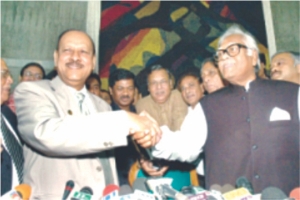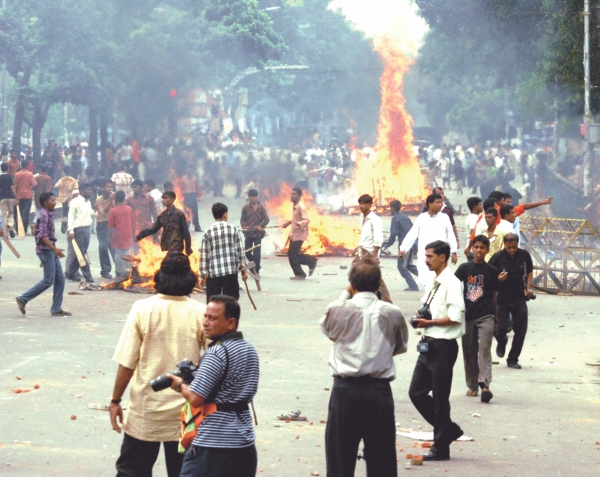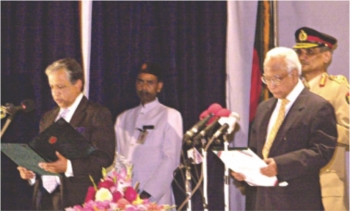| Home - Back Issues - The Team - Contact Us |
 |
| Volume 10 |Issue 44 | November 25, 2011 | |
|
|
Current Affairs Dialogue is the Order of the Day SHAKHAWAT LITON The rickshaw puller says his name is Rafiqul Islam. He is from Ulipur Upazila of Kurigram district. He does not exactly know how old he is now! He says his age in between 35 to 40 or may be more than that. His wife and two children--a son and a daughter live at his village Narikelbari. He stays in Mohammadpur at a rickshaw garage free of cost. The owner of the garage lets Rafiqul and others like him stay at the garage as they pull his rickshaws and pay him rent per day. Rafiqul says he pays Tk 80 as rent of a rickshaw he pulls for 8/9 hours a day since morning. He earns between Tk 350 to Tk 400 per day. Excepting the rent for rickshaw, he has to pay Tk 80 per day for his meals. At the end of the day, he can save Tk 200 more or less per day. Rafiqul gives the above brief description about himself in a straightforward way.
Rafiqul claims he passed class-V. I asked him if he knows name of the MP of his area, he answers very quickly and says people do not like the MP. Why? He says because he lives in the capital and does not frequently visit the people in his constituency. It is true- the MP elected from the parliamentary constituency is an industrialist; whether the MP visits his constituency frequently or not– was not cross examined. Asked about his assessment of the future political situation in the country, Rafiqul says he is hearing that the opposition parties will wage a movement for the caretaker government. Wouldn't it be better for rickshaw pullers to earn more if hartal is enforced? "No. No. It's not right. We do not find passengers on hartal day like before. People do not come outside of their home on hartal days," Rafiqul says. He remembers the days of political turmoil at the end of 2006 when his earning was reduced because there weren't enough passengers. According to Rafiqul only 'bad people' will benefit from hartal. Asked what politicians should do now to avert hartal. "They should talk and find a solution to the problems existing between them," says Rafiqul in the morning of November 22. A day before, Speaker Abdul Hamid called on the ruling and opposition parties to sit in dialogue to resolve the present political standoff. “I don't believe that the sword or the gun can bring peace anywhere in the world. They rather create anarchy and worsen the situation,” he says while talking to reporters at the parliament building premises. The Speaker said both the treasury and opposition benches should give space to each other in the interest of resolving problems arising out of the political standoff. “There will be no solution if neither side has the mentality of leaving any space for the other,” says Hamid. If solution to the increasing political standoff is not found through dialogue, what might be the consequences? Like many other worried people, Dr Akbar Ali Khan fears a further deterioration into the political situation.
"The consequence of the failure to find a solution to the crisis may be worse than the past state of emergency situation. Even supporters of both the political rival camps may engage in conflict triggering a civil war like situation in the country," cautions Dr. Khan, in an interview with a Bengali daily published on the day the speaker urged both the parties to sit in dialogue. As an adviser to the caretaker government formed amid the growing political crisis, Dr Khan had negotiated with the two rival camps—AL and BNP–to break a political standoff over the ninth parliamentary elections. But the talks could not succeed due to flip-flop stance of the then chief adviser Iajuddin Ahmed who allegedly acted on the advice of the BNP. However Dr Khan is now optimistic along side the rising fear. "Good will of the politicians is enough to overcome the situation." BNP Chief Khaleda Zia says the government will have to take the initiative to resolve the current political standoff over the caretaker government issue. “It is the responsibility of the government. They'll have to decide what they'll do. We've already cleared our position to the people,” Khaleda told UNB at her Gulshan office on November 18. She said this when asked to comment on the suggestion put forth by UN Secretary General Ban Ki-moon that political parties should end their differences through dialogue. Wrapping up his three-day visit to Bangladesh, Ban at a press conference at Sonargaon Hotel in the capital, expressed the hope that all differences of opinion among political parties and stakeholders should be resolved harmoniously and peacefully through dialogue. His call again triggered the discussion in public domain over dialogue between the ruling and opposition camps to reach a consensus. People are expecting them to sit in talks. But is there any development in the political landscape? Will the ruling party ring the bell? Or will the possibility of talks again fizzle out only in the war of words?
People have Lost Confidence! Ruling Awami League General Secretary and LGRD Minister Syed Ashraful Islam on June 17 this year, said discussion was the only way to find a solution to problems and there was no alternative to dialogue. "So, we are certain that the discussion on the caretaker government must be held with the opposition party," Ashraf said. At that time he also said the government will not do anything unilaterally over the caretaker government system. Syed Ashraf's promises seemed to fall a little flat at a time when BNP-led opposition parties had already boycotted the talks organised by the parliamentary special committee for constitutional amendment in April. Boycotting the talks on constitutional amendment that she was invited to by the parliamentary special committee, Khaleda Zia termed it "conspiratorial". Finally, the government unilaterally abolished the caretaker government system by amending the constitution on June 30. The public was not surprised. In an online survey conducted by daily Prothom Alo on Ashraf's assurance shows that 78 percent people did not have confidence in the AL general secretary's statement. A total of 2187 people cast votes in the online survey conducted in between June 18 to 19. Another online survey of the daily conducted in between June 2 to June 3 people were asked to cast vote whether there was any possibility of understanding between the two major political parties on the caretaker government issue. A total of 1174 people cast vote and of them 70 percent said 'no'. At that time the prime minister, her cabinet colleagues and also leaders of ruling AL were using the Supreme Court's verdict to defend their decision to scrap the caretaker government system. They were claiming that there was no scope to keep the caretaker government after the Supreme Court declared it illegal and void. But people could not believe in the government and ruling AL leaders' claims. Another online survey of the daily Prothom Alo conducted in between May 31 to June 1 people were asked to vote if the government and ruling AL leaders' claims were right or wrong. A whopping 80.7 percent of total 2249 people who cast votes rejected the claims. Sticking to its guns the main opposition BNP also boycotted the electoral reforms talks organised by the Election Commission in June this year. BNP's boycott has largely frustrated the EC's move to proceed with the electoral reform proposals for the next parliamentary elections. In the wake of confrontational culture of politics, people are still skeptical about the prospect of holding talks between the two arch-rival camps to come up with a solution. After the UN secretary general's call for dialogue, the daily Prothom Alo conducted on line survey on it in between November 15 to November 16 asking people to express their opinion if the politicians will respond the call. A staggering 76 percent of total 2833 people who cast vote said "no". Public opinion is almost always against the current trend in politics. But unfortunately politicians do not pay heed to it, although many leaders in both AL and BNP want to respond to people's call. But they remain silent fearing that their party's top leaders may not like it. The animosity between Hasina and Khaleda has reached extreme levels frustrating people including supporters of their parties. Without naming Prime Minister Sheikh Hasina and Leader of the Opposition Khaleda Zia, a lamented Speaker Abdul Hamid on November 20 said, “Neither of the two wants to see each other's face. I don't understand why it is so.” Now the politicians will have to come forward to regain people's confidence in them. People expect political leaders will look beyond their party lines to avert any possible political turmoil for the future of Bangladesh. And solution to the problems created by them lies in their own hands. No foreign friend can help to negotiate a deal between them. People remember only too well, the days of political turmoil between 1994 to 1995 when many diplomats and donor agencies stepped into the negotiation. Even Sir Ninian Stephen, special envoy of the then secretary general of the Commonwealth, arrived at Dhaka on October 13, 1994 to negotiate with the then ruling BNP and opposition AL for a solution to the political standoff over introduction of the caretaker government system. But all efforts failed as the country's politicians remained steadfastly stubborn. Necessity Knows no Law! What was the result of the failure of the dialogue? In three years—1994 to 1996, the country's economy and people had to feel the heat of violent street agitations including 96 days of hartal enforced by the then opposition parties led by the AL to meet their demands.
Not only that, amid the boycott of agitating political parties, a farcical parliamentary election was held on February 15, 1996 spending the tax payers' money. The sixth parliament constituted through the polls lasted only 11 days. The only task it performed was introduction of the caretaker government by amending the constitution, although the then BNP-led government had been rejecting the opposition's demand terming the caretaker government system "unconstitutional". Political crisis again mounted, centring the ninth parliamentary election. The then ruling BNP and main opposition AL held talks half-heartedly at the end of 2006. Due to their unbent stance, the general secretary level talks held at the Jatiya Sangsad Bhaban fell flat, triggering street violence on the eve of BNP-led government's handing over power to a caretaker government. The then president Iajuddin Ahmed started negotiating with the major parties, but suddenly he assumed the office of the chief adviser without resolving the crisis. After a series of unpleasant political incidents, the country was heading towards a grave political crisis and fear conflict was rising. The BNP-led four party alliance was determined to have the parliamentary polls on January 22 while the AL-led grand alliance declared to boycott and resist it. Amid such a situation, the armed forces intervened in the politics. Iajuddin Ahmed was forced to step down from the office of the chief adviser and declare the state of emergency. And then a new caretaker government led by Fakhruddin Ahmed was formed that stayed office around two years without constitutional backup. Necessary reforms in the electoral laws were brought and the ninth parliamentary polls were held on December 29, 2008. The above incidents reiterate the well known proverb—necessity knows no law. And if things in the political landscape do not change and politicians do not come forward to break the political standoff, the emerging necessity must find ways without considering their legality.
Copyright
(R) thedailystar.net 2011 |



